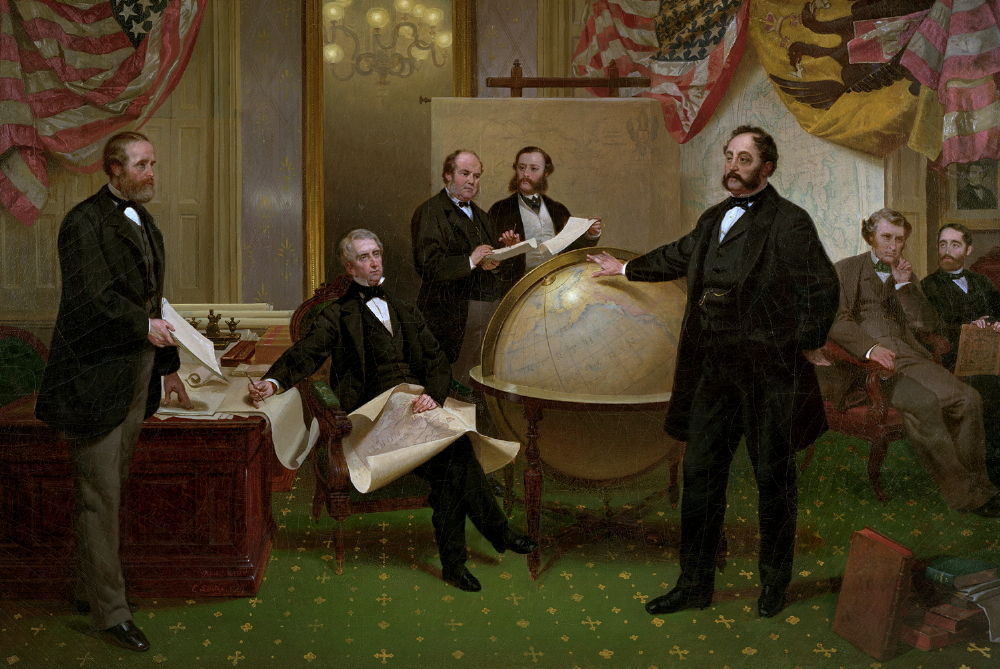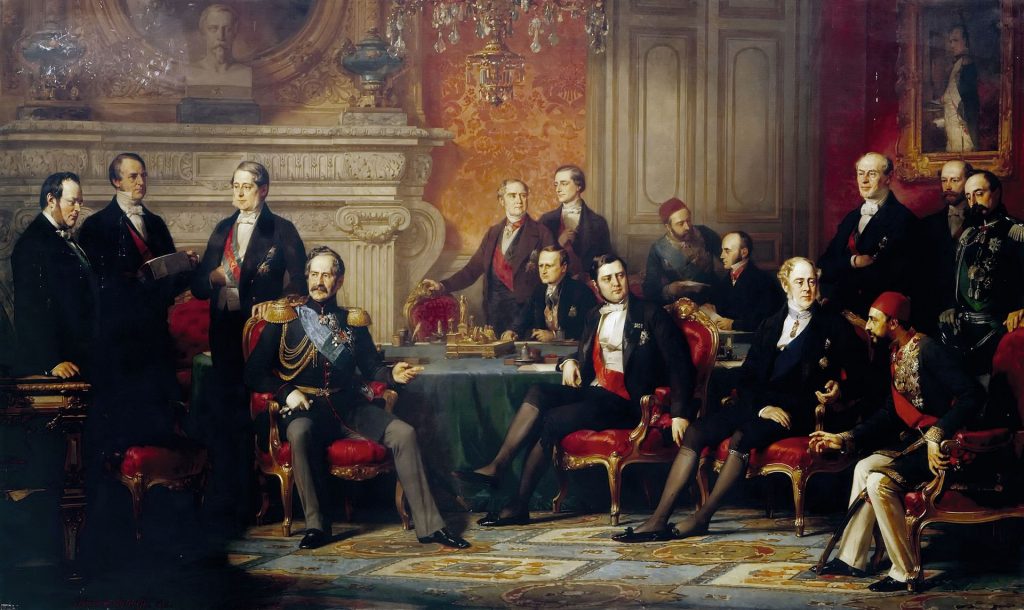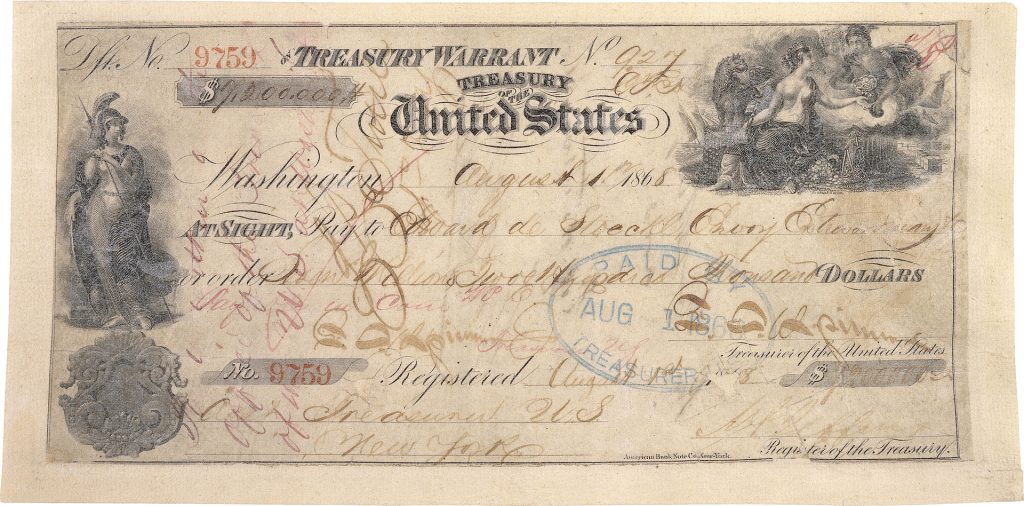
The Crimean War (1853-1856) pitting Imperial Russia against the combined forces of the Ottoman Empire, Great Britain, and France, had devastating consequences. Emerging military technology combined with disease led to the deaths of hundreds of thousands of soldiers on both sides of the conflict. Even the far eastern Russian city of Petropavlovsk – located on the Kamchatka Peninsula in the Pacific – was besieged by British and French naval forces. As a result, after Russia was forced to sue for peace, Czar Nicholas II decided to sell the frontier province of Alaska to the Americans rather than see it end up in British hands.

The treaty signed at the congress brought an end to the Crimean War.
586,412 square miles (1,518,800 km2) at $7.2 million = 2 cents per acre.
For the United States Secretary of State William H. Seward, the chance to buy Alaska was a godsend. He moved quickly and quietly to seal the deal. “In March, 1867, formal negotiations were instituted for the purchase of Alaska, and before the month closed, a treaty for that object was signed by Mr. Seward and Mr. de Stoeckl, the Russian Minister.”[1] Long known to be an expansionist, Seward understood that acquiring the large territory (for a bargain) meant not only the acquisition of future resources, but a geostrategic foothold in the North American region closest to Asia. Charles Sumner, the Senate Foreign Relations Committee Chairman who supported the purchase, noted in a speech that “Russia ‘wished to strip herself of all outlying possessions as Napoleon had stripped himself of Louisiana [in 1803] in order to gather her strength for her struggle with England for the control of Asia.’” This nineteenth-century Anglo-Russian rivalry in Asia is known as the “Great Game.” According to the historian James R. Gibson, the motivations behind selling Alaska were geopolitical rather than financial – as both America and Russia…
…shared a common antipathy towards Britain. Indeed, the United States had sympathized with Russia during the Crimean War. U.S.-British relations deteriorated further during the American Civil War (1861-65), when Britain remained “suspiciously neutral” and continued to trade with the rebellious Southern states. And Britain had long made clear its hostility to American expansion in the Pacific Northwest.[2]

Despite the prevailing myth that Americans opposed the purchase by labeling it “Seward’s Folly” or a “polar bear garden,” the purchase of Alaska received widespread popular support. On the other hand, the British tried to downplay the sale while disguising their apprehensions:
We hardly think that any great jealousy will be excited through the renunciation of these barren tracts by Russia… They are remote, incapable of colonization, comparatively uninhabited… and in a sense militarily worthless. We, with our enormous range of dominion in that quarter of the globe, can almost afford to stand by, quiescent, while Russia and the American Union change places on the American continent. Still, the consequences to British Columbia must be serious…[3]

In August of 1869 Seward visited Alaska and delivered a speech at Sitka – a small town previously named Fort Archangel Michael when Russian explorers first settled there in 1799. From 1808 to 1867, Sitka had been the capital of Russian America. Now it was in U.S. hands. Seward said that the entire Northwest was “destined to become a shipyard for the supply of all nations.” As for the neighboring British and their concerns with being overrun by American settlers, Seward offered a friendly warning: “British Columbia, by whomsoever possessed, must be governed in conformity with the interests of her people and society upon the American continent. …If it shall be governed so as to conflict with the United States, we can easily see what will happen in that case.” [4] One wonders what the Czar thought about Seward’s speech.
[1] George E. Baker (ed.), The Works of William H. Seward, Vol. 5 (Boston: Houghton, Mifflin and Company, 1884), 25.
[2] James R. Gibson, “Why the Russians Sold Alaska.” The Wilson Quarterly (1976-) 3, no. 3 (1979): 187. See: Evgeny Sergeev, The Great Game, 1856–1907: Russo-British Relations in Central and East Asia (Washington DC: Woodrow Wilson Center Press, 2013).
[3] The Standard, London, April 2, 1867.
[4] San Francisco Chronicle, September 5, 1869. Speech given at Sitka August 19,1869.
About the author
Benjamin J. Swenson has been living and working in Korea since 2008. His doctoral dissertation at Pompeu Fabra University (UPF) in Barcelona, Spain, covered Euro-American military and legal history, and the advent of guerrilla warfare and counterinsurgency doctrine in the nineteenth century. He is currently an Assistant Professor in the Department for Human Creativity at Hoseo University in Asan – where he lives with his wife and son. His hobbies include chess, painting, hiking, and bonsai.
5 thoughts on “The Year America Praised Russia: The Great Game and Sale of Alaska, 1867”